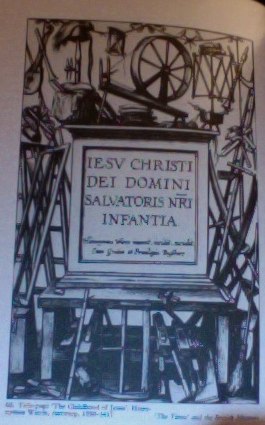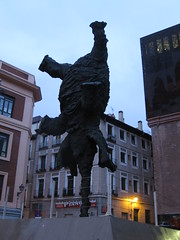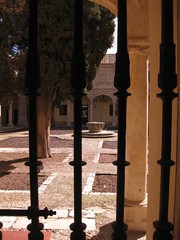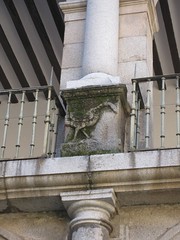Since post last week on migration Holyrood vs Westminster, found link on the BBC website to the the BBC News ‘Reality Check’ on immigration that showed net outflow of non-EU. That is migration is out of the country not in! Also Mark Easton’s blog @ the BBC, which gives more info. Bottom line is that the outflow is even greater then the figure of 8000 given on BBC News.
Category Archives: personal
migration Holyrood vs Westminster
 So refreshing watching the Scottish election debate last night. The audience there saw immigration as a positive thing, bringing fresh skills and wage earners (and tax payers) to the country.
So refreshing watching the Scottish election debate last night. The audience there saw immigration as a positive thing, bringing fresh skills and wage earners (and tax payers) to the country.
This is in such sharp contrast to the UK general election leaders debates, where questions about immigration were all of the “what are you going to do about …” kind and prompted the prospective prime ministers of all parties into a competition as to who could put the boot in most vigorously. To be fair, the least anti-migrant was Nick Clegg including his memorable attempt to get David Cameron to admit that most migration was from EU countries and so not going to be affected by any of their policies.
After that UK debate the Telegraph challenged Nick Clegg’s claim that 80% of migration was non-EU. However, BBC News 24 had a sort of ‘facts behind the claims’ slot and in their figures the net non-EU migration was actually negative; that is in the last year there were more non-EU people leaving the country than entering. Unfortunately BBC News don’t have this information on their web site to link to 🙁 My guess is the difference in the figures depends on whether you take into account student visas where there will be a very large influx and outflux each year, and whether you simply look at total immigration in a year or net migration. Certainly the BBC News figures suggested that all the major parties were overestimating the ‘problem’.
The great thing in the Scottish debate was that this was not viewed as a ‘problem’ at all.
warming to Gordon
 Yesterday, my postal vote went off and lacking a Plaid Cymru candidate far from my homeland I made do with the best of the rest. This is perhaps the most exciting election in the UK for many years as it seems likely that one result will be a change in the voting system, so that in future elections I will not feel I need to vote ‘tactically’, but more for the people, parties and policies that I most deeply support.
Yesterday, my postal vote went off and lacking a Plaid Cymru candidate far from my homeland I made do with the best of the rest. This is perhaps the most exciting election in the UK for many years as it seems likely that one result will be a change in the voting system, so that in future elections I will not feel I need to vote ‘tactically’, but more for the people, parties and policies that I most deeply support.
While this did not take me to the Labour fold at this election, one of the most surprising things about the general election campaign has been that throughout it, not withstanding gaffs along the way, I have found myself warming to Gordon Brown
Good Friday
 Here are two writings from several years ago, one written on Good Friday, the other about it. My father was a carpenter and this has always made some aspects of the life of the Galilean carpenter particularly close to my heart.
Here are two writings from several years ago, one written on Good Friday, the other about it. My father was a carpenter and this has always made some aspects of the life of the Galilean carpenter particularly close to my heart.
One is a ‘Good Friday journal‘ web page (life before blogs), a meditation about nails and even a tips on what to do if a nail bends.
Being the son of a carpenter I was fascinated looking at the nail realising how much went into the design of each one. …
So much detail, such care, such knowledge built into something bought and used in hundreds of thousands each day.
Perhaps this is true of people too, six billion, teaming and crowding over distant lands …
The second is a poem about “the carpenter“, written the same Easter:
… I do remember
hands reaching out
finding themselves for the first time
seizing the air
holding nothing
until touching, holding, the hard edge of wood
more …
making part-time work?
Woke early worrying how to make the part-time thing work.
Looking forward through the year and adding up every odd day at home, still less than 18 weeks worth of ‘my time’, not exactly half of 52! Even adding a couple of weeks of non-essential travel into ‘my’ budget doesn’t make it add up.
More worrying is that the time is all chopped up. Just three solid months (and one of those is in July/August, maybe when I’d expect some research and holiday time anyway), the rest odd weeks split up with other commitments. the model I’m aiming for is nearer the US 9 month contract idea with big periods for research, but struggling to keep blocks clear.
Also I’ve noticed myself allocating things that should be ‘university business’ to ‘my time’ as I know they won’t get done otherwise. Got too used to doing the academic thing and planning time around assumption of 200% commitment averaging 80-90 hours a week. Now trying to squash that into 50% of my time – no wonder it is difficult!
As the half pay cheques start to mount, I need to start to be ruthless.

in Madrid
St David’s Day
not for itself
 While writing the last post and searching for a references, I noticed that I’d never made available the notes of a talk I gave at the “Design and Non-Place Workshop” in Edinburgh back in 2005. So I have just put “Not for itself: insider/outsider orientation of place and signage and systolic flows?” online. The talk reflects on some of the events of the exciting non-place network including a meeting at B&Q in Edinburgh and another at Stanstead airport.
While writing the last post and searching for a references, I noticed that I’d never made available the notes of a talk I gave at the “Design and Non-Place Workshop” in Edinburgh back in 2005. So I have just put “Not for itself: insider/outsider orientation of place and signage and systolic flows?” online. The talk reflects on some of the events of the exciting non-place network including a meeting at B&Q in Edinburgh and another at Stanstead airport.
I pick up just a few of the threads from those visits, looking particularly and the way ‘place’ transforms over time, the way signage addresses itself, and the different kinds of flow in populated space. At B&Q especially I was fascinated by the back of the store, the place that gets ignored and yet which was critical for services and the actual delivery of goods.
I can’t recall why (five years ago now!), but the talk slides only tenuously connect to the text of the notes, I think maybe because I was touching on too many issues in the brief notes.
Total Quality, Total Reward and Total Commitment

I’ve been reading bits of Richard Sennett’s The Craftsman1 off and on for some months. It has had many resonances, and I meant to write a post about it after reading its very first chapter. However, for now it is just part of one of the latter chapters that is fresh. Sennett refers to the work of W. Edwards Deming, the originator of the term ‘total quality control’. I was surprised at some of the quotes “The most important things cannot be measured”, “you can expect what you inspect” — in strong contrast to the metrics-based ‘quality’ that seems to pervade government thinking for many years whether it impacts health, policing or academia, and of course not unfamiliar to many in industry.
- Richard Sennett, The Craftsman, Penguin, 2009[back]
Been to London to visit the Queen
… well Queen Mary, University of London anyway. Giving a talk on “The New Media of Digital Light”1. While there I was given interesting tours of various research groups in the School of Electronic Engineering and Computer Science at QML including music that plays along with the drums, maps for the blind, and red dots on the heads of crowds at Covent Garden.
 On the tube I noticed that if you are standing and look at the reflections in the curved tube train windows, all the seated passengers become Siamese twins joined at the head. Also looking down standing people tend to stand with their toes pointing outwards, whereas for seated people only the men do that. I feel there must be a social psychology paper in that, but it has probably already been written.
On the tube I noticed that if you are standing and look at the reflections in the curved tube train windows, all the seated passengers become Siamese twins joined at the head. Also looking down standing people tend to stand with their toes pointing outwards, whereas for seated people only the men do that. I feel there must be a social psychology paper in that, but it has probably already been written.
At the hotel neo-classical statues line the way down to an underground car park, and while seated at a WiFi sweet spot, was overhearing a dissident group planning a protest.
A typical day out in London.
A reminder of Wales, Aberavon Road, near QML










